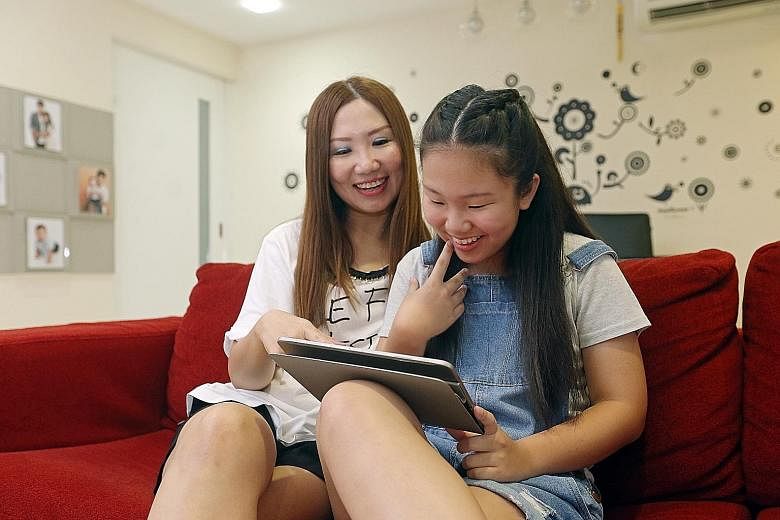Most parents would notice and have a problem if they learnt their 12-year-old watches six hours of television a day.
Yet, children are being allowed to spend that much time on electronic devices such as mobile phones and tablets.
This is worrying, said experts, following a study by think-tank DQ Institute and the Nanyang Technological University (NTU). Children can come across inappropriate material, develop bad sleeping patterns and even an addiction to devices.
So, what did the pilot study find?
Twelve-year-olds here spend almost 46 hours a week - or over 6½ hours daily - glued to a screen. Even nine-year-olds are spending over 24 hours a week, or about 3½ hours daily, doing the same.
-
IN FRONT OF A SCREEN
46
Number of hours 12-year-olds spend a week before a screen
24
Number of hours nine-year-olds spend a week before a screen
SOCIAL MEDIA AND CHAT APPLICATIONS
77%
12-year-olds who actively use social media and chat apps
55%
Nine-year-olds who actively use social media and chat apps
OWNERSHIP OF MOBILE DEVICE
70%
12-year-olds who have their own mobile device
52%
Nine-year-olds who have their own mobile device
SOURCE: DQ INSTITUTE AND NANYANG TECHNOLOGICAL UNIVERSITY
The study was conducted over four months, from August to December last year. It surveyed 1,407 children, aged eight to 12.
Cutting the time they spend on devices will not be easy. More than half of nine-year-olds already have their own mobile device. This increases to 70 per cent by age 12.
Dr Yuhyun Park, founder of DQ Institute, which is dedicated to improving digital education and innovation, said the findings are not surprising. Studies overseas have also found that screen time for kids can add up to five to seven hours daily.
This is because the digital world is now the children's playground, explained the 41-year-old senior research scientist at NTU.
"These children are in an unprecedented predicament. What they see and play and who they meet online can influence their development greatly, even more than their parents and teachers."
Children go online to use search engines, listen to music, watch videos and play video games, the study found.
EXPOSURE TO DANGERS
Children are exposed to online dangers, which include cyber bullying, online grooming, inappropriate content and, yes, fake news.
Dr Park said: "The terrible part of the digital world is that your mistakes remain. When you post a stupid photo online, it can go permanent and viral. Kids have to be aware because it has real-life impact on their future."
The study also revealed that 55 per cent of nine-year-olds are actively using social media and chat applications, despite such platforms requiring participants to be at least 13 years old.
About 77 per cent of the 12-year-olds surveyed are on social media.
Reacting to the findings, housewife Joanne Ang, 40, who has two children aged nine and 11, said: "Kids want to fit in. But they are young and may not know how to tell right from wrong."
Mrs Jean Ong, who has two primary school-going children, limits their screen time to two hours a day, but this often snowballs to nearly four hours daily when her children request more time to play games or chat with friends.
The 42-year-old said: "My concern is that it becomes a habit, such that they feel like they cannot live without their devices."
Prior studies have consistently found excessive usage of mobile devices to be associated with poorer sleep quality which affects mood and mental capacity, and can lead to weaker school performance.
National University of Singapore (NUS) lecturer Kelvin Seah said excessive usage of devices could "alter sleeping habits, as (people) stay up later into the night to use them".
Assistant Professor Ryan Hong, from the NUS psychology department, said that over-usage may even lead to addiction. Children may feel uneasy without their devices, he said. "The prolonged use of mobile devices can also impede children's ability to connect socially with people offline."
WHAT CAN BE DONE?
There are several programmes to help children adopt good online habits. A movement launched last month, known as #DQEveryChild, aims to arm kids with digital citizen skills to navigate the Internet safely. It suggests that there are eight skills, such as digital empathy and critical thinking, that kids should acquire. Dr Park, who started the movement, said: "The idea is to help our children be masters, not slaves, of technology."
Schools also have the resources to keep parents updated on the latest cyber trends and offer them tips on supporting their kids, the Education Ministry said. Some hold talks and workshops on such issues.
But, parents too need to educate their children on the responsible usage of devices and set reasonable limits on their screen time, so they have time for other activities.
And, it starts by setting a good example, said Dr Hong. "It is not uncommon to see a family at a restaurant, with all members engaged with their mobile devices rather than with one another," he explained. "Parents should be mindful and take the initiative to cultivate a family culture of encouraging face-to- face social interactions."
TOMORROW: DIGITAL HABITS OF ADULTS IN SINGAPORE


